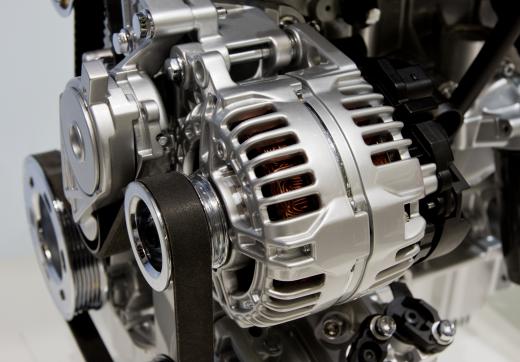A ribbed pulley is used to keep a belt from slipping as it turns around the pulley. The ribbing takes the form of grooves that are machined onto the pulley's surface. The ribs are usually matched to a specific belt, made with ridges that fit into the grooves. This keeps the belt from slipping off the pulley and destroying or damaging other parts of a machine or work area. Ribbed pulleys are used in a variety of different industries, including mining, transport, and the automotive industry.
Most of the time, the ribs in a ribbed pulley are V-shaped, which is why these pulleys are also known as a V-ribbed pulleys. The surface of the pulley is machined in such a way that one or more grooves run around the surface that will be in contact with the belt. Deeper ribbing makes it less likely that the belt will slip off the pulley while it is turning.

A typical ribbed pulley will be designated by a number and a letter. The letter specifies the configuration and spacing of the grooves in the pulley. The number is used to determine how many grooves run around the circumference of the pulley. When determining which type of belt to use with a ribbed pulley, the letter designation, number of grooves, and width of the pulley are all important factors. The belt should have the same letter and number and be slightly smaller in width than the pulley in order to fit properly.

In the engines of most automobiles, a ribbed belt known as the serpentine belt is fitted to a ribbed pulley that is connected to the crankshaft. This belt and pulley system is used to power many different parts of the car, including the stereo and the power steering. Ribbed pulleys are also often used on conveyor belts in transport or mining, when large or heavy material needs to be moved along a conveyor belt without the risk that the belt will fall off the pulley, damaging equipment and causing delays.
In some cases, a ribbed pulley is used along with a smooth belt. Though this does not offer the security of using a matching ribbed belt and pulley, but it can provide a bit more traction to a conveyor system. A ribbed pulley might be used for extra security, especially when the risk of the belt slipping off is low. The opposite set-up, using a ribbed belt and an unribbed pulley is also used.
